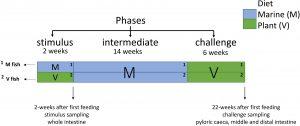A new study investigated how early nutritional programming with plant-based diets influences metabolic and immunoregulatory pathways in the gut transcriptome of Atlantic salmon (Salmo salar L.). Early nutritional intervention has been proposed as a way to enhance the health and growth of fish, particularly in aquaculture settings where plant-based feeds are increasingly common due to sustainability concerns.
Additional Reading: How Gut Immune Cells Strategically Position Themselves to Combat Infections
The researchers examined the effects of feeding Atlantic salmon a plant-based diet during their first feeding stage. The study revealed that early exposure to plant-based nutrition led to significant changes in the gut transcriptome, specifically in pathways related to metabolism and immune regulation. These changes were characterized by an upregulation in genes involved in metabolic processes, indicating that the fish were better able to process and utilize plant-based diets when they were exposed to them early in life.

Figure 1 Details of dietary manipulations performed on Atlantic salmon with two sampling points for transcriptome/RNA-seq samples. Gut (whole, plyoric caeca, middle and distal intestines: n = 6 for each gut region) was sampled at the end of phases (sampling points are indicated by arrowheads at the end of the stimulus and challenge phases).
Immunoregulatory pathways were also significantly affected, with key genes involved in immune responses being more active in fish that received early plant-based diets. This suggests that early dietary programming could improve the immune function of salmon, potentially making them more resilient to diseases and environmental stressors later in life.
The implications of these findings are particularly relevant for aquaculture, where plant-based feeds are being used as alternatives to fishmeal and other animal-based ingredients. Early nutritional programming may help farmed fish better adapt to plant-based diets, resulting in improved growth, health, and disease resistance. This research highlights the importance of early dietary interventions in shaping the long-term physiological responses of fish to plant-based nutrition.
As plant-based diets continue to gain popularity in aquaculture, understanding how early exposure to these diets affects fish health is crucial. This study provides valuable insights that could help optimize feeding strategies for Atlantic salmon, improving their performance in plant-based feeding systems and enhancing the sustainability of aquaculture operations.
Summary by Faith Oluwamakinde










